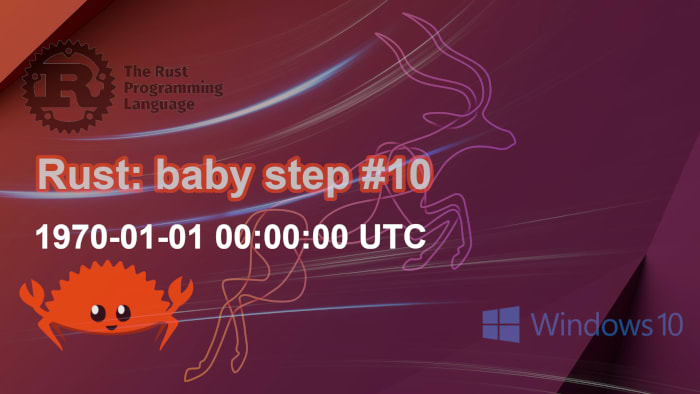We look at some simple seconds since epoch calculations using std::time and time crate.
 |
|---|
| Rust: seconds since epoch -- “1970-01-01 00:00:00 UTC”. |
I've done some seconds since epoch calculations in Python before. I try to do similar calculations in Rust. This is a documentation of the code which I've tried out. These're just simple calculations which enable me to understand this epoch time subject better.
❶ The first example is from Constant std::time::UNIX_EPOCH, and does not require any third party crate, and can be compiled using rustc:
Content of src/main.rs:
use std::time::{SystemTime, UNIX_EPOCH};
fn main() {
//
// UNIX_EPOCH: "1970-01-01 00:00:00 UTC"
//
match SystemTime::now().duration_since(UNIX_EPOCH) {
Ok(n) => println!("1970-01-01 00:00:00 UTC was {} seconds ago!", n.as_secs()),
Err(_) => panic!("SystemTime before UNIX EPOCH!"),
}
}
On both Ubuntu 22.10 and Windows 10, the output looks like:
1970-01-01 00:00:00 UTC was 1699787014 seconds ago!
Of course, if you happen to run this example, there would be more seconds than in the reported output -- we're getting older by the seconds 😂!
The next examples require time crate. Cargo.toml is common for all examples. Its dependencies section is as follow:
...
[dependencies]
time = {version = "0.3.22", default-features = false, features = ["formatting", "macros"]}
-- We've previously also discussed time crate in a bit more detail in this post Rust: baby step -- some preliminary look at date.
❷ In this second example, I'd like to assert that if we've a date and time just one (1) second after the epoch, i.e. UNIX_EPOCH, then the seconds since epoch should be one (1) second.
Following is the complete working example, it's compiled with cargo build.
Content of src/main.rs:
use time::macros::datetime;
use std::time::{SystemTime, UNIX_EPOCH};
fn main() {
// "1970-01-01 00:00:01 UTC"
let offset_dt = datetime!(1970-01-01 0:00:01 UTC);
let system_time = SystemTime::from(offset_dt);
println!("offset_dt: {:#?} \n", offset_dt);
println!("system_time: {:#?} \n", system_time);
match system_time.duration_since(UNIX_EPOCH) {
Ok(n) => println!("1970-01-01 00:00:00 UTC was {} seconds ago!", n.as_secs()),
Err(_) => panic!("SystemTime before UNIX EPOCH!"),
}
}
My Rust version on Windows 10 and Ubuntu 22.10 are the same:
F:\rust\datetime>rustc --version
rustc 1.70.0 (90c541806 2023-05-31)
behai@hp-pavilion-15:~/rust/datetime$ rustc --version
rustc 1.70.0 (90c541806 2023-05-31)
However, the output is slightly different between the two OSes. On Windows 10:
offset_dt: 1970-01-01 0:00:01.0 +00:00:00
system_time: SystemTime {
intervals: 116444736010000000,
}
1970-01-01 00:00:00 UTC was 1 seconds ago!
On Ubuntu 22.10:
behai@hp-pavilion-15:~/rust/datetime$ ./target/debug/datetime
offset_dt: 1970-01-01 0:00:01.0 +00:00:00
system_time: SystemTime {
tv_sec: 1,
tv_nsec: 0,
}
1970-01-01 00:00:00 UTC was 1 seconds ago!
However, both report one (1) second since epoch, which's what we've expected.
❸ In this third example, I'd like to assert that if we've a date and time just one (1) second after the epoch, as in the second example then add another 1 (one) minute, then the seconds since epoch should be sixty one (61) seconds.
Content of src/main.rs:
use time::{macros::datetime, Duration};
use std::time::{SystemTime, UNIX_EPOCH};
fn main() {
// "1970-01-01 00:00:01 UTC"
let offset_dt = datetime!(1970-01-01 0:00:01 UTC) + Duration::minutes(1);
let system_time = SystemTime::from(offset_dt);
println!("offset_dt: {:#?} \n", offset_dt);
println!("system_time: {:#?} \n", system_time);
match system_time.duration_since(UNIX_EPOCH) {
Ok(n) => println!("1970-01-01 00:00:00 UTC was {} seconds ago!", n.as_secs()),
Err(_) => panic!("SystemTime before UNIX EPOCH!"),
}
}
Output on Windows 10:
offset_dt: 1970-01-01 0:01:01.0 +00:00:00
system_time: SystemTime {
intervals: 116444736610000000,
}
1970-01-01 00:00:00 UTC was 61 seconds ago!
Output on Ubuntu 22.10:
behai@hp-pavilion-15:~/rust/datetime$ ./target/debug/datetime
offset_dt: 1970-01-01 0:01:01.0 +00:00:00
system_time: SystemTime {
tv_sec: 61,
tv_nsec: 0,
}
1970-01-01 00:00:00 UTC was 61 seconds ago!
❹ In this fourth and last example, I'd like to see that if I add one (1) hour to the current UTC date time, then the seconds since epoch of the later is 1*60*60 = 3,600 (three thousand six hundred) seconds more than the former's.
Content of src/main.rs:
use time::{OffsetDateTime, Duration};
use std::time::{SystemTime, UNIX_EPOCH};
fn main() {
let offset_dt = OffsetDateTime::now_utc();
let offset_dt_1_hour = offset_dt + Duration::hours(1);
let dt_secs: u64;
let dt_1_hour_secs: u64;
match SystemTime::from(offset_dt).duration_since(UNIX_EPOCH) {
Ok(n) => dt_secs = n.as_secs(),
Err(_) => panic!("1. SystemTime before UNIX EPOCH!"),
}
match SystemTime::from(offset_dt_1_hour).duration_since(UNIX_EPOCH) {
Ok(n) => dt_1_hour_secs = n.as_secs(),
Err(_) => panic!("2. SystemTime before UNIX EPOCH!"),
}
println!("Seconds: {}", dt_1_hour_secs - dt_secs);
}
And the output is as expected:
Seconds: 3600
My three (3) examples are almost puerile 😂, actually I think they are... However, they help me to understand this issue much more concretely. Puerile as they are, I still like them. I hope you find them helpful too.
For more on epoch, the following Wikipedia article is worth skimming over: Epoch (computing).
Thank you for reading and please stay safe as always.
✿✿✿
Feature image source:



Top comments (0)